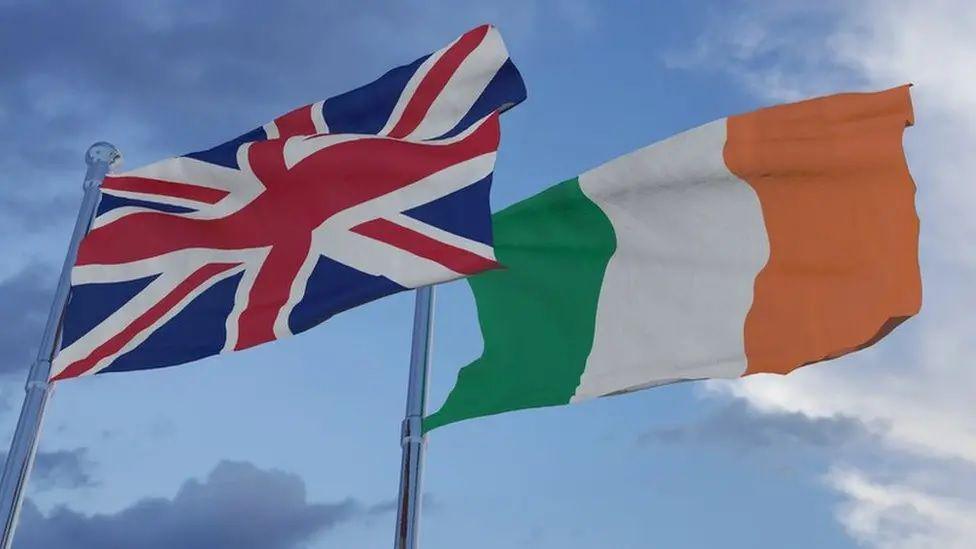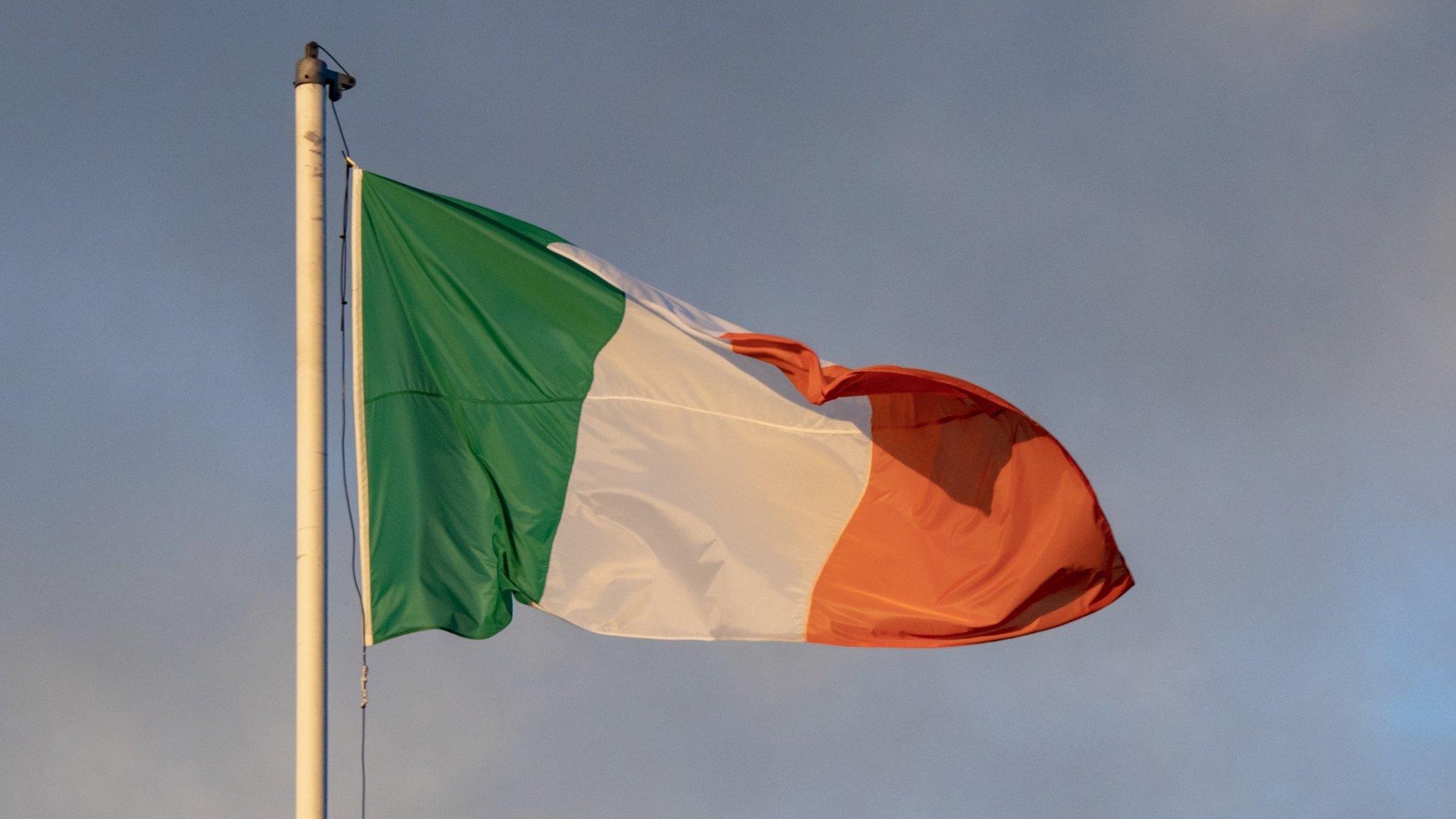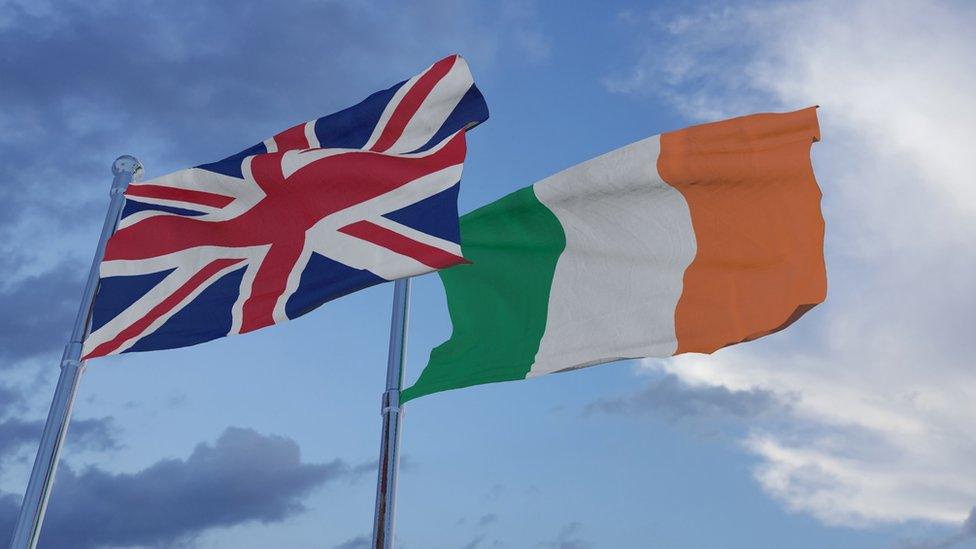Stormont's £800k flags report 'still on shelf' three years on

The commission was set up in 2016 to find consensus on flags and difficult cultural issues
- Published
An £800,000 Stormont report aimed at addressing disputes over flags and bonfires has not been implemented almost three years since it was published.
The report by the Commission on Flags, Identity, Culture and Tradition (FICT) was released in December 2021.
A working group set up to look at its proposals has not met in more than two years.
The Executive Office said the FICT report will be considered as part of a review of its community relations strategy.

Professor Dominic Bryan, co-chair of the flags commission
Professor Dominic Bryan, co-chair of the commission, said he was "disappointed that it hasn't moved faster".
"There are some areas where we had agreement across all the political parties, such as on bonfires, where there really could be advances made," he said.
The Queen's University Belfast academic said he was hopeful the report would not be left "on a shelf".
"We put a lot of resources into it, people put a lot of time and effort into it," he said.
"Having got a cross-party agreement on things, I really think it's worth holding onto and taking forward."
Stormont's Executive Office set up FICT in 2016 in an effort to tackle disagreements over a range of identity and cultural issues such as flags and bonfires.
When the report was released, the Executive Office said a working group - involving junior ministers, advisers and officials - would "continue to meet" to consider it.
The working group met once in January 2022 before Northern Ireland's power-sharing government collapsed later that year.
It has not been reconvened since the Northern Ireland Executive was restored in February after a two-year hiatus.
Alliance Party assembly member Paula Bradshaw, chair of the Executive Office scrutiny committee, expressed concern at the lack of progress.
She has submitted a private member's bill which seeks to implement some of the FICT proposals on flags.
"While absolute consensus was not reached on every issue during the FICT process, there was absolute consensus the status quo is unacceptable," she added.
What was in the FICT report?
The commission was formed under the Fresh Start Agreement.
Its 15-member panel, which involved political and non-political appointees, consulted with many stakeholders and community groups.
It had been due to report in December 2017 - 18 months after it was set up.
But its work was affected by the collapse of devolution in January 2017.
Its findings were finally presented to the Stormont executive in July 2020, but were not published until December 2021.
The papers runs to 168 pages and contains 17 chapters looking at a range of areas including identity, flags, bonfires, murals, memorials in public spaces.
On flags, the commission said it had not reached agreement on whether changes should be made to legislation on placing flags on lampposts and other street furniture.
But it said there was "widespread agreement" on the elements of a possible "code of practice", such as keeping flags away from interfaces.
On bonfires, the commission recommended that only wood should be burnt and the gathering of materials should be limited to the six weeks before the pyre is lit.
Restrictive covenants
In the absence of consensus at Stormont, the regulation of flags appears to be happening elsewhere.
Property lawyer Philip Armstrong said flags were being prohibited from new housing developments through what are known as "restrictive covenants".
These legal rules contained in property deeds can cover a wide range of areas.
But Mr Armstrong said they were now "routinely" being used in relation to flags.
"I would say that in most new-build properties, we are seeing restrictive covenants which are prohibiting the exhibition or display of flags or banners or emblems," he said.
"I think that's a sign that developers particularly realise that for the future attractiveness of the development and properties for sale, an absence of those political emblems can be a real advantage."

Philip Armstrong said covenants are "routinely" being used to restrict the display of flags
'Inform broader thinking'
Stormont’s Executive Office is the joint department of First Minister Michelle O'Neill and Deputy First Minister Emma Little-Pengelly.
In a statement a spokeswoman said: "The recommendations of the FICT report are under consideration as part of the current review of the T:BUC (Together: Building a United Community) strategy.
"This will ensure the cross cutting and wide-reaching impacts of the issues covered within FICT inform broader thinking on good relations."
Related topics
- Published21 November 2023

- Published1 December 2021
